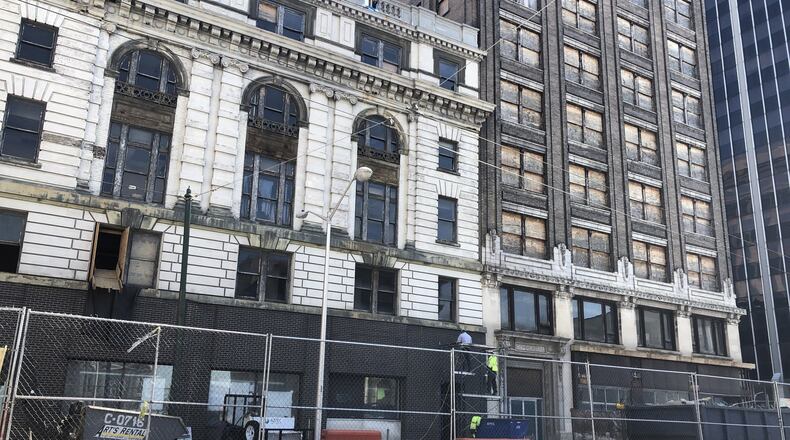The financial closing must happen by then or the arcade redevelopment project would forfeit a portion of the New Market Tax Credit incentives it has been awarded, city officials said.
RELATED: City’s $10 million loan to Dayton Arcade largest in 15 years
Whaley called it “the most complicated project” in the city’s history and said it is the largest and most important deal since the construction of Fifth Third Field, which brought minor league baseball to the city.
The project will create affordable artist housing, retail and restaurants, a public event space, new arts programming spaces and a 95,000-square-foot innovation hub.
In a major step forward for the project, the University of Dayton and the Entrepreneurs Center next week are expected to sign a 10-year lease to occupy space in the nine-building arcade complex, said Dayton City Manager Shelley Dickstein.
The “center for creativity” will be one of the largest university-anchored innovation hubs in the nation and an economic engine in the city, she said.
MORE: Dayton’s $10M deal: Dayton Arcade must reopen by 2020
“When completed, the arcade will serve as an economic catalyst that will spur development in downtown while preserving a historic and iconic Dayton landmark,” said Dickstein.
The arcade development team has pushed back the anticipated closing date multiple times. In April 2018, developers said the closing was likely to happen in July 2018.
In April this year, the city will vote on a variety of legislation related to incentives and financing for the arcade project and agreements intended to solidify the community benefits of the complex’s renewal.
Dayton commissioners will decide whether to loan $11 million to the project and approve property tax incentives and special district designations to provide funds for energy improvements.
MORE: Arcade is definitely happening, developer says: ‘We’re way too pregnant’
Commissioners also will decide whether to approve a loan for low-income housing in the arcade as well as an agreement aimed at ensuring other neighborhoods in the city benefit from the arcade’s reopening and activities.
The arcade innovation hub will be connected to all parts of the city with programming and “opportunity labs,” Dickstein said.
The batch of legislation is needed to prepare for the financial closing for the roughly $95 million first phase of the arcade project, which focuses on the southern buildings in the complex.
Dickstein said the closing must happen because or else the project will have to give up some of its tax credits.
The project is using New Market Tax Credits, and there’s a deadline for allocation that if not met would result in the arcade losing funding. The project also has won millions of dollars in state historic tax credits and other funding sources.
“When you have a project like this, you have to throw everything and the kitchen sink at it to make it happen,” Dickstein said.
Whaley said important pieces of the project will fall apart if the deal is not done by April 25.
Preliminary demolition is underway at the arcade. Crews have cleaned and repainted portions of the arcade’s well-known steel and glass dome, including decorative plaster turkeys and an ornamental cornucopia.
Building permits have been issued, and contracts have been awarded for the rehab work.
Whaley said the arcade is a difficult deal involving a challenging set of buildings in a “weak market.”
But, she said, the arcade when reopened will drive entrepreneurship in the community and is an investment in Dayton’s citizens.
“Just like it took 25 years for this deal to happen, the arcade’s work will reverberate for the next 25 years as well,” Whaley said.
The arcade closed in 1991 and has collected dust since then.
In addition to housing, retail and restaurants planned, other community benefits connected to the arcade are likely to include summer and after school programs for students, an” entrepreneur academy,” pitch competitions for student-run businesses and apprenticeships and internships.
The Dayton Daily News contacted the University of Dayton for comment, but university officials said they do not have any information to share at this point.
About the Author

